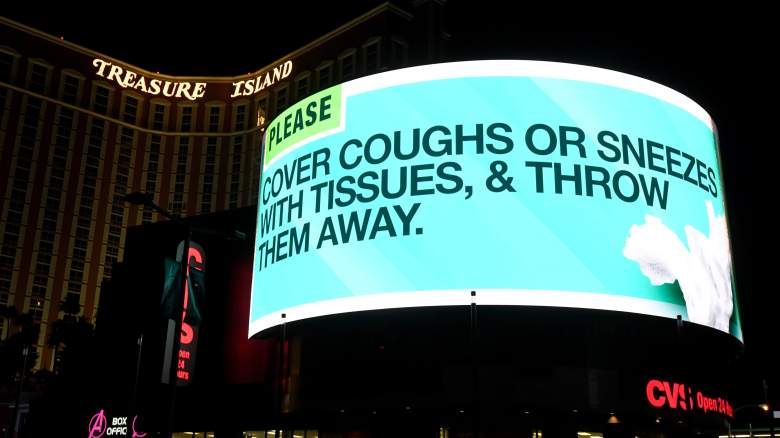
Getty The Las Vegas Strip during the COVID-19 pandemic on March 28, 2020 in Las Vegas, Nevada.
News of coronavirus cases and updates on the pandemic’s spread are everywhere. Many people are stressed and worried about themselves and their loved ones, making them extremely aware of whether they’re developing symptoms or not. Since spring is upon us, many people are now wondering what the difference is between coronavirus symptoms and allergies, especially seasonal allergies.
It’s important to remember that the CDC has outlined the top symptoms as fever, cough and shortness of breath. That being said, some people with COVID-19 only have mild or no symptoms, and others report having only one of those symptoms at most. The first thing to do when feeling unwell is to consider the symptoms.
People Should Consider What Symptoms They Feel as There Are Some Differences
Dr. Amesh Adalja, an infectious disease specialist at the Johns Hopkins Center for Health Security, spoke to The New York Times and said “It’s usually your nose and eyes where you develop symptoms of seasonal allergies,” so people should think about where the symptoms started.
Dr. Adalja explained that respiratory viruses like the COVID-19 coronavirus or the seasonal flu affect the whole body, which means people are more likely to feel body aches, a fever, or a headache.
The University of Utah Health said it’s important to look at the pattern. “Allergic reactions can include anything from itchiness in your eyes, nose, and mouth area to a runny nose or cough.” It explains that these symptoms don’t necessarily mean you have a virus infection like COVID-19.
Instead, they’re symptoms that are “caused by our sensitized mast cells in the sinus, nose, eyes, mouth, and throat area. When these cells are exposed to an allergen, they release histamines, which are responsible for these inflammatory responses.”
Aaron Kobernick, MD, an allergist and immunologist at the University of Utah Health says that fever is an important indicator of COVID-19. “You just don’t get fevers from allergies like you do with the flu, COVID-19, or the common cold,” he explained. In terms of a stuffy or runny nose, which is common for seasonal allergies, it’s rare to get that symptom with coronavirus.
Another key difference between the two is that allergies are “generally prolonged” and will continue until they’re treated or the allergen is removed, whereas COVID-19 symptoms will progress more quickly and potentially seriously over a shorter timeframe.
Asthma Can Flare Up During Allergy Season & Be Confused for COVID-19 As Well
People with asthma can experience difficulty breathing or shortness of breath, both well-documented symptoms of coronavirus. However, as the Cleveland Health Clinic points out, breathing and shortness of breath “can also be signs of asthma that can flare up with the allergy season.”
Dr. Michael Benninger, MD, said that people who suffer from asthma must stay in front of their treatment and be up to date with their medication like nasal sprays or inhalers. He added that this is especially important because those with existing respiratory issues are already at higher risk of “potentially severe illness from coronavirus.”
READ NEXT: ‘Nobody Wants Dasani Water’: Coronavirus Meme Spreads